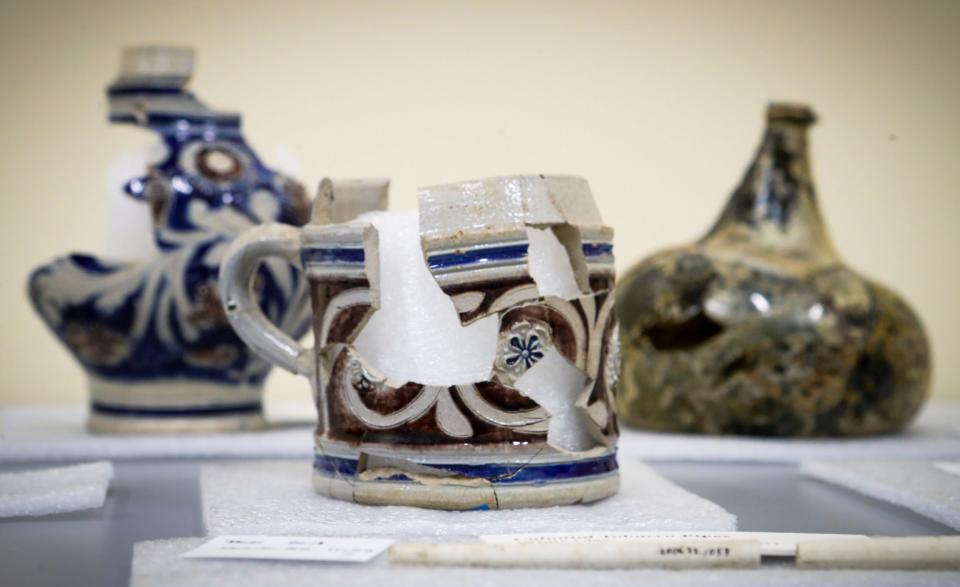The colorful life of John Avery, the owner of historic Avery's Rest
- Oops!Something went wrong.Please try again later.
For well over a decade, archaeologists have been periodically digging at Avery’s Rest, a colonial homesite on the north shore of Rehoboth Bay near King’s Creek.
When the top layer of earth was scraped away, the archaeologists found a colonial cellar, a well, pottery fragments, part of a horse bridle, bottles, a buckle, a pistol ball, pipe stems and eating utensils. Another dig uncovered graves with 11 skeletons, eight of European descent and three of African heritage.
The human remains and the plethora of artifacts, however, failed to breathe life into the colorful character of John Avery.
In the 1670s, former Maryland colonist John Avery settled on a tract of 350 acres of land which became Avery’s Rest, where he lived with his wife, Sarah, their five children and at least two slaves.
When Captain Avery arrived in Sussex County, he found a sparsely settled colony that was less than 50 years old. A modest collection of small wooden homes in Lewes served as the county seat; but colonial officials had not yet constructed a courthouse.
Although some legal proceedings were held in a tavern or one of the town’s other buildings, the local colonial officials were striving to establish a proper, dignified government when they were confronted with the salty language of Captain John Avery.
In 1676, not long after Avery settled on the Delaware coast, Magistrate Edward Southrin got into a courtroom dispute with Avery, and the retired sea captain called him “You pitiful, lousy rascal let me know (if) you ever grant any … warrants against [me] and you had better be hanged; and if the governor doth let such pitiful rascals to be in commission, I will not sit with such a pitiful fellow as thou art.”

According to Luke Watson, another justice of the peace, when, “(T)he rest of the magistrates could not consent to do and determine things as he would have it … he [would] have a great rage and fury; (and) he went out of the court cursing and swearing, calling … the rest of the court fools, knaves, and rouges; wishing that if he ever he sat amongst us again, that the devil might come and fetch him away. And also threatening and presently after, did strike one of the magistrates with his cane; and had he not been prevented by the spectators, might (have) done much damage that way.”
On another occasion, Watson was accosted by a drunken Avery, who called him a beggarly rouge and a thief. Watson replied that if Avery did not retract these statements, Watson would sue him; but Avery so intimidated the other justices of the peace that they would not bring a formal complaint against the raucous former sea captain.
In April 1681, Avery was involved in a dispute with Andrew Evenne, and when the case was heard in the Lewes courtrooms, Avery broke into a rage and let loose his usual litany of epithets.

The court threatened to fine him, but gave Avery an opportunity to retract his intemperate remarks. He replied that he “would see the devil take us all before he would (retract his statements).” After this second outburst, the court ordered that Avery should be fined ten pounds sterling.
The unrepentant Avery, however, was finally silenced a short time later when he passed away. Avery’s Rest was abandoned, the buildings collapsed, and they were covered over with soil until archaeologists discovered the remains of the salty sea captain’s colonial home.
The artifacts that they found provided valuable clues about how Avery lived in the 17th century. Court records, however, revealed the personality of this hot-tempered mariner who railed the dignity of the court, by calling the magistrates, “fools, knaves, and rouges.”
DELAWARE HISTORY: New DNA research could unearth lost stories of Delaware's early Black residents
HISTORY HIKES: Walk this way: 6 places to hike, soak up history, see autumn leaves and maybe a few ghosts
Principal sources
Maddy Lauria, “Unearthing lost stories,” Delaware Wave, Sept. 29, 2020.
Craig W. Horle, ed., Records of the Courts of Sussex County Delaware, 1677-1710, Philadelphia, 1991, pp. 112-113.
Edwin Jaquett Sellers, Captain John Avery, Philadelphia: 1897, J. P. Lippincott, pp. 17-18, 22-24.
This article originally appeared on Salisbury Daily Times: The colorful life of John Avery, the owner of historic Avery's Rest

